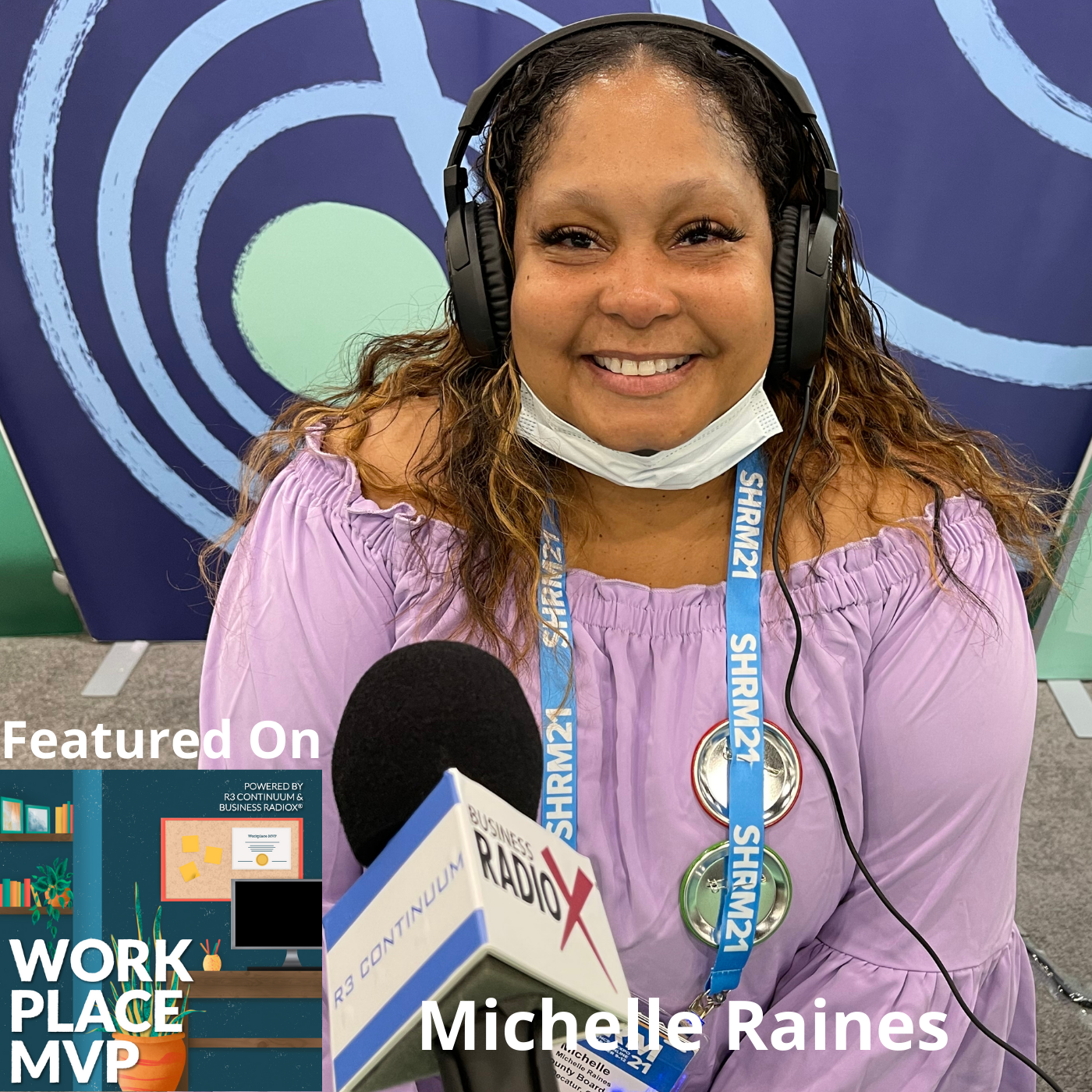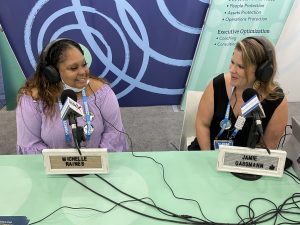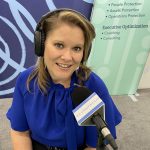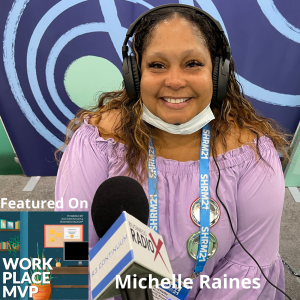
Workplace MVP LIVE from SHRM 2021: Michelle Raines, DeKalb County (Georgia) Board of Health
On this live edition of Workplace MVP, Michelle Raines, Human Resources Director at the DeKalb County (Georgia) Board of Health shared with Jamie how they show appreciation to their employees, how they navigated (and still are) keeping the department staffed during COVID, and how they all work as a team. Workplace MVP is underwritten and presented by R3 Continuum and produced by the Minneapolis-St.Paul Studio of Business RadioX®.
This show was originally broadcast live from the 2021 SHRM Annual Conference held at the Las Vegas Convention Center in Las Vegas, Nevada.

Michelle Raines, Human Resources Director at DeKalb County Board of Health

Michelle Raines began her Human Resources career in the hospitality industry and then moved into state government in Georgia. in 2018 she became Human Resources Director for the DeKalb County Board of Health.
The DeKalb County (Georgia) Board of Health
The Board of Health works to protect and improve the health of those who live, work and play in DeKalb County.
DeKalb County’s most striking characteristic is the diversity of both its communities and its people. Although the county is mostly suburban, it includes an urban area (part of the city of Atlanta) as well as rural areas. Also, DeKalb’s more than 660,000 residents represent more ethnic groups than any other county in the southeastern United States.
The Board of Health continually strives to meet the varied health needs of all the residents of DeKalb County. However, they know that creating healthier communities involves what everyone does collectively to assure the conditions in which people can be healthy.
About Workplace MVP
Every day, around the world, organizations of all sizes face disruptive events and situations. Within those workplaces are everyday heroes in human resources, risk management, security, business continuity, and the C-suite. They don’t call themselves heroes though. On the contrary, they simply show up every day, laboring for the well-being of employees in their care, readying the workplace for and planning responses to disruption. This show, Workplace MVP, confers on these heroes the designation they deserve, Workplace MVP (Most Valuable Professionals), and gives them the forum to tell their story. As you hear their experiences, you will learn first-hand, real-life approaches to readying the workplace, responses to crisis situations, and overcoming challenges of disruption. Visit our show archive here.
Workplace MVP Host Jamie Gassmann

In addition to serving as the host to the Workplace MVP podcast, Jamie Gassmann is the Director of Marketing at R3 Continuum (R3c). Collectively, she has more than fourteen years of marketing experience. Across her tenure, she has experience working in and with various industries including banking, real estate, retail, crisis management, insurance, business continuity, and more. She holds a Bachelor of Science Degree in Mass Communications with special interest in Advertising and Public Relations and a Master of Business Administration from Paseka School of Business, Minnesota State University.
R3 Continuum
R3 Continuum is a global leader in workplace behavioral health and security solutions. R3c helps ensure the psychological and physical safety of organizations and their people in today’s ever-changing and often unpredictable world. Through their continuum of tailored solutions, including evaluations, crisis response, executive optimization, protective services, and more, they help organizations maintain and cultivate a workplace of wellbeing so that their people can thrive. Learn more about R3c at www.r3c.com.
Company website | LinkedIn | Facebook | Twitter
TRANSCRIPT
Intro: [00:00:02] Broadcasting live from the SHRM 2021 Conference at the Las Vegas Convention Center, it’s time for Workplace MVP. Brought to you by R3 Continuum, a global leader in workplace behavioral health, crisis, and security solutions. Now, here’s your host.
Jamie Gassmann: [00:00:21] Hey, everyone. Jamie Gassmann here, your host of Workplace MVP. And I am broadcasting from the SHRM 2021 Conference here in Las Vegas, Nevada. And with me today is Michelle Raines from DeKalb County, Georgia, Board of Health. Welcome to the show.
Michelle Raines: [00:00:38] Thank you for having me.
Jamie Gassmann: [00:00:40] So, tell us a little bit about your career journey and a little bit about what you do at the Board of Health.
Michelle Raines: [00:00:45] Okay. So, I began my career in H.R. back in ’93. I used to work for Marriott International for actual hotel, which if you can learn H.R. there, you can learn it anywhere.
Jamie Gassmann: [00:00:59] I like that. I can only imagine.
Michelle Raines: [00:01:01] Turnover is just off the chart. We literally had new employee orientation every week. So, I developed H.R. skills, training skills, and then I advanced. One of my coworkers, her daughter worked for the State of Georgia, and she told me about a training position. I applied and interviewed and I got that position. So, I was a trainer for about seven years, it used to be called Department of Human Resources for the State. Then, our director retired and they did some – they called it reorganizing. It was more like a hostile takeover. So then, they merged training and H.R. together, so then I got back into H.R.
Michelle Raines: [00:01:47] At the time, they made all trainers travel. I had a small two year old daughter, so traveling all the time wasn’t going to work. So, they said, “Well, the only job we have is class and compensation.” I said, “Well, sign me up.” So, I did that for about a year. Then, I moved on to another state position where I did more like consulting, workforce planning, succession planning. I would sit with different agencies and I was their consultant to work on their plan for their agency. That was required every year that they had to turn in a workforce development plan and succession plan to the State. So, I helped them do that.
Michelle Raines: [00:02:27] Then, we moved into – it’s called Eperformance, the performance management system that became electronic. And so, I was on the original charter team for that. So, I got some good training with that. And then, we went out throughout all the State of Georgia and trained everyone on how to use the new tool and how it worked. And so, I got recognized, and someone recruited me from another state agency to be their H.R. Generalist, so I did that. Then, the crash of 2009 happened.
Jamie Gassmann: [00:03:01] Yes. We remember that.
Michelle Raines: [00:03:03] So, I was laid off. So, you can get laid off in state employment, believe it or not. So, I was laid off, so I was out for about a year, a-year-and-a-half, and interviewed because I wanted to come back with the State. I had reached my ten years with [inaudible] with Georgia. And then, I came back in and the job posting looked just like my resume, so I applied. And sure enough, I got it within, like, a week or two. And I came back as an H.R. Manager, I did that for about five years. Then, transferred again to be a deputy director, I did that for three years. And then, DeKalb had a position for director, so I applied for that and I got that, now, I’ve been there since 2018.
Michelle Raines: [00:03:45] Fantastic. So, you really got kind of a well-rounded résumé.
Michelle Raines: [00:03:49] I do.
Jamie Gassmann: [00:03:49] I can imagine that is really helpful as you’re navigating, you know, potentially different challenges and things of that nature.
Michelle Raines: [00:03:55] Yes. Absolutely.
Jamie Gassmann: [00:03:56] So, it’s interesting going from, like, the hospitality industry and rolling into kind of a government agency, are there differences in that? So, talk to us a little bit about that. You know, if there was somebody listening to the show and they’re looking at switching industries, talk a little bit about what were some of the changes or things you had to learn when you switched over to the government sector?
Michelle Raines: [00:04:19] Well, coming from private sector, of course, is different going into government sector. But we worked in hospitality, which is a lower paying industry, so they did a lot for their employees. Like, we got to spend $25,000 on the Christmas party, and we had one every year. We had, you know, full bar, full food and, I mean, nice stuff people pay the hotel for. But we have access to the ballrooms, to the staff, to the food, so that kind of stuff. You know, being able to have the money to reward employees, we cannot use government funds for anything like that because it’s a conflict of interest, taxpayer money. So, that is a challenge.
Michelle Raines: [00:05:00] Because government workers work hard and there’s limited things that you can do to really reward staff. Of course, the State, again, limited funds, limited budgets. There was a period of time we went almost, I think, eight years with no raises because it wasn’t in the State budget. So, that’s a big difference. And, again, recruiting and retaining that top talent because we are competing with people who have money.
Jamie Gassmann: [00:05:31] Yeah. Well, and that’s got to be challenging. And I think some other businesses that maybe are private that are smaller might exhibit or experience some of the same restrictions. So, how do you kind of engage those employees to the point where they – like, what are some of the benefits that they would be able to get? Or how do you navigate that, I guess, to create that culture that they want to stay?
Michelle Raines: [00:05:52] Well, they’ve always had the 12 paid holidays, so we get holidays that other people don’t get. The benefit package, when I first started with the State back in’99 was more competitive than it is now. Now, it is a little bit more expensive. We have telework. We’re putting together now strategies that we can advance people because career growth, salary, those are the number one reasons why people leave, and also a sense of purpose.
Michelle Raines: [00:06:23] So, working with Board of Health, especially during a pandemic, a lot of people don’t come for the money, they come for the purpose and giving back to the community, and that’s how we engage. Then, we try to reward, like, as we can. And it’s not always money. Sometimes it’s an event. Sometimes we do staff appreciation every year. You know, we might have a luncheon, get a speaker because we can pay for training. We just have to stay within the bounds of the rules. We have a lot of long time employees. Of course, the retirement. We still have a pension plan. So, that’s a big draw.
Jamie Gassmann: [00:07:03] Yeah. That’s not very common nowadays.
Michelle Raines: [00:07:04] No. It’s not common. People have to actually save their own money, which, you know, a lot of people don’t do. So, that’s a draw. And, again, we try to create an environment that people want to work. We try to be flexible. We try to have work-life balance when people are in school. We try to do individual things case-by-case as to where, you know, the flexibility allows. Because sometimes with that higher pay, when I worked at Marriott, all managers were required to work 50 hours a week.
Jamie Gassmann: [00:07:38] Yeah. Right. You’re going to get a higher salary, but you’re going to put in the time that way.
Michelle Raines: [00:07:42] But you work for that. Yes.
Jamie Gassmann: [00:07:42] So, that’s fascinating. So, you kind of have to get creative and you almost kind of have to look a little bit out of the box in terms of, “Well, this could be a training and they’re going to learn something from it.” You know, that’s very interesting.
Jamie Gassmann: [00:07:58] So, in talking of the pandemic and looking at it over the last year, what have been some of the challenges that you’ve had? Because, obviously, as a frontline essential worker working in Board of Health, you had to be on. I mean, they’re leaning on you. So, talk to me a little bit about some of the challenges you had over that last year.
Michelle Raines: [00:08:17] Well, the first one was with, of course, childcare, because that just kind of hit and schools just dropped out. And we actually had to do a survey with all managers to survey all their employees to ask, Who has childcare issues? Who cannot get childcare for their children? And we worked with those employees. So, we had some employees that could telework, and they did. Some who, for a period of time, they could not work. And then, the rest of us, we just kind of picked up the slack so that business kept moving. Then, we had, of course, the medically fragile, so those people due to their underlying health conditions who it was a danger for them to come to work, so we had that group of people.
Michelle Raines: [00:09:07] And then, of course, immediately they passed the FFCRA, but we had to manage all of those things, all the different pockets and pots, and make sure people knew how to apply what they needed to present to us. We had to track them while they were out. You know, we had some that had leave, some that didn’t. Some that were hourly staff that typically don’t get leave or anything like that. So, we had a lot of that going on. I have a staff of five people, including myself. So, we just made it happen. And then, in between, you still had your regular normal H.R. things to do.
Jamie Gassmann: [00:09:46] Yeah. Wow.
Michelle Raines: [00:09:47] Yeah. Employee relations didn’t get any better during that time.
Jamie Gassmann: [00:09:50] And in terms of, like, your team now looking at it a year later, obviously we have some of the same challenges we’ve had over this last year, how have you sustained kind of that supportive culture taking care of them? How do they keep going, basically?
Michelle Raines: [00:10:05] So, in H.R., what we did was, when everything first broke out, we got to telework three days and come to the office two. So, we had staggered schedules. You know, it’s H.R., so people will wander up to the floor and they want to see somebody physically there. So, we made sure we had coverage and we worked with each other. So, you know, you had an issue and you needed to switch, we were flexible with one another so that we can continue to work-from-home three days. That’s how we started.
Michelle Raines: [00:10:38] Now, we have two days, so it’s the same thing, and we get two days a week with a small staff, but we make it happen. We had recently an employee whose son was going to college, so she asked her coworker, “Can you switch with me?” We want to keep that privilege to where we’re not coming back five days a week. But, also, it helps from a safety standpoint. It helps people feel more secure because they’re not exposed to people. Now, we have a vaccine that’s available. Back then, we didn’t have that. So, it made people feel more comfortable because we went to a staggered staff across the whole agency.
Jamie Gassmann: [00:11:18] Interesting. So, like, half the staff on, half the staff off.
Michelle Raines: [00:11:21] Yeah. More like a third.
Jamie Gassmann: [00:11:23] A third. Okay. Interesting.
Michelle Raines: [00:11:24] Yeah. Because we had those teleworking, those medically fragile, we made sure everybody had access to laptops, VP, and there was a lot of technology. You know, I always had a laptop, but certain departments didn’t have one. So, we switched from desktops to laptops. So, now, probably 95 percent of the agency has laptops. And those that don’t are because it’s a stationary desk.
Jamie Gassmann: [00:11:50] Right. It’s a different type of work.
Michelle Raines: [00:11:51] It’s a different type of work.
Jamie Gassmann: [00:11:52] So, looking at it now, it’s been a year, and obviously, back in the early kind of timeframe last year, everybody kind of went remote, I’m guessing. How is the staff now? Are they fully back into the office? Is it more of a hybrid situation? Is it more of a case-by-case?
Michelle Raines: [00:12:10] Well, let’s just say, we’ve gone fully back multiple times. So, the first bringing back to people to work was in June. And then, because of summer so some people with childcare issues didn’t have that issue because it’s summertime, so those people came back. Then, of course, it hit again in August in Georgia, that’s when school starts. So, certain people had to go back out or work remotely because of that. Then, in December, we sent out notification for a hard return when school started back in January. And we still had some that, you know, we did a case-by-case, but the majority came back. And, again, we take it as it comes in.
Michelle Raines: [00:12:55] Some people test positive and there’s a whole quarantine process, and all of that. And we just managed it as it comes. So, I’d say right now we probably have 80 percent of the staff back. There are still some that are still medically fragile, who they telework 100 percent. Some have a hybrid method. In clinical operations, of course, it’s difficult to see a nurse and the nurse is at home, so they have to be on site. We’re still doing testing. We’re still doing vaccination sites. We still have all of those things.
Jamie Gassmann: [00:13:34] Wow. Your hands are full, I’m guessing, a little bit.
Michelle Raines: [00:13:38] Yes.
Jamie Gassmann: [00:13:38] And managing all those different employee requirements or needs, really, and balancing it in a way where they feel comfortable and safe and sure is kind of a main priority. That’s so interesting. So, if anybody listening wanted to get a hold of you, kind of just touch base, networker, or any of those different things, how could they do that?
Michelle Raines: [00:14:00] Email me. My work email is michelle, M-I-C-H-E-L-L-E, .raines, R-A-I-N-E-S, @dph, D as in Dog-P as in Peter- H as in hello, .ga.gov.
Jamie Gassmann: [00:14:19] Wonderful. And thank you for all of the work that the Board of Health has done, and for you, and supporting those employees that were able to help out your county. And thank you for joining us today.
Michelle Raines: [00:14:31] Thank you for having me.
[00:14:31] And if you are in the SHRM area listening in on our show, definitely stop by our booth, we are in R3 Continuum’s booth. The Workplace MVP podcast is broadcasting from the SHRM Conference in Booth 4076. Thank you again, and it’s a wrap.















